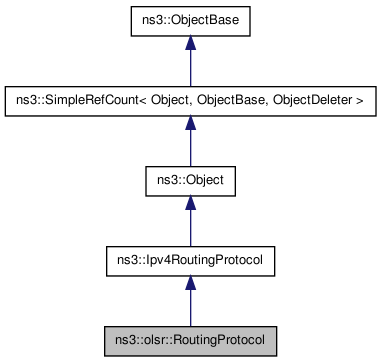OLSR routing protocol for IPv4. More...
#include <olsr-routing-protocol.h>


Public Member Functions | |
| void | SetMainInterface (uint32_t interface) |
| Set the OLSR main address to the first address on the indicated interface. | |
| void | Dump (void) |
| std::vector< RoutingTableEntry > | GetRoutingTableEntries () const |
| std::set< uint32_t > | GetInterfaceExclusions () const |
| void | SetInterfaceExclusions (std::set< uint32_t > exceptions) |
| void | AddHostNetworkAssociation (Ipv4Address networkAddr, Ipv4Mask netmask) |
| Inject Association to be sent in HNA message. | |
| void | SetRoutingTableAssociation (Ptr< Ipv4StaticRouting > routingTable) |
| Inject Associations from an Ipv4StaticRouting instance. | |
Static Public Member Functions | |
| static TypeId | GetTypeId (void) |
| This method returns the TypeId associated to ns3::olsr::RoutingProtocol. | |
Protected Member Functions | |
| virtual void | DoStart (void) |
Friends | |
| class | OlsrMprTestCase |
Detailed Description
OLSR routing protocol for IPv4.
Member Function Documentation
| virtual void ns3::olsr::RoutingProtocol::DoStart | ( | void | ) | [protected, virtual] |
This method is called only once by Object::Start. If the user calls Object::Start multiple times, DoStart is called only the first time.
Subclasses are expected to override this method and _chain up_ to their parent's implementation once they are done. It is safe to call GetObject and AggregateObject from within this method.
Reimplemented from ns3::Object.
| void ns3::olsr::RoutingProtocol::Dump | ( | void | ) |
Dump the neighbor table, two-hop neighbor table, and routing table to logging output (NS_LOG_DEBUG log level). If logging is disabled, this function does nothing.
| std::vector<RoutingTableEntry> ns3::olsr::RoutingProtocol::GetRoutingTableEntries | ( | ) | const |
Return the list of routing table entries discovered by OLSR
| static TypeId ns3::olsr::RoutingProtocol::GetTypeId | ( | void | ) | [static] |
This method returns the TypeId associated to ns3::olsr::RoutingProtocol.
This object is accessible through the following paths with Config::Set and Config::Connect:
- /NodeList/[i]/$ns3::olsr::RoutingProtocol
- /NodeList/[i]/DeviceList/[i]/$ns3::AlohaNoackNetDevice/Phy/$ns3::Ipv4RoutingProtocol/$ns3::olsr::RoutingProtocol
- /NodeList/[i]/DeviceList/[i]/$ns3::AlohaNoackNetDevice/Phy/$ns3::olsr::RoutingProtocol
- /NodeList/[i]/DeviceList/[i]/$ns3::BaseStationNetDevice/BsIpcsPacketClassifier/$ns3::Ipv4RoutingProtocol/$ns3::olsr::RoutingProtocol
- /NodeList/[i]/DeviceList/[i]/$ns3::BaseStationNetDevice/BsIpcsPacketClassifier/$ns3::olsr::RoutingProtocol
- /NodeList/[i]/DeviceList/[i]/$ns3::BaseStationNetDevice/LinkManager/$ns3::Ipv4RoutingProtocol/$ns3::olsr::RoutingProtocol
- /NodeList/[i]/DeviceList/[i]/$ns3::BaseStationNetDevice/LinkManager/$ns3::olsr::RoutingProtocol
- /NodeList/[i]/DeviceList/[i]/$ns3::BaseStationNetDevice/SSManager/$ns3::Ipv4RoutingProtocol/$ns3::olsr::RoutingProtocol
- /NodeList/[i]/DeviceList/[i]/$ns3::BaseStationNetDevice/SSManager/$ns3::olsr::RoutingProtocol
- /NodeList/[i]/DeviceList/[i]/$ns3::BaseStationNetDevice/ServiceFlowManager/$ns3::Ipv4RoutingProtocol/$ns3::olsr::RoutingProtocol
- /NodeList/[i]/DeviceList/[i]/$ns3::BaseStationNetDevice/ServiceFlowManager/$ns3::olsr::RoutingProtocol
- /NodeList/[i]/DeviceList/[i]/$ns3::NonCommunicatingNetDevice/Phy/$ns3::Ipv4RoutingProtocol/$ns3::olsr::RoutingProtocol
- /NodeList/[i]/DeviceList/[i]/$ns3::NonCommunicatingNetDevice/Phy/$ns3::olsr::RoutingProtocol
- /NodeList/[i]/DeviceList/[i]/$ns3::SubscriberStationNetDevice/Classifier/$ns3::Ipv4RoutingProtocol/$ns3::olsr::RoutingProtocol
- /NodeList/[i]/DeviceList/[i]/$ns3::SubscriberStationNetDevice/Classifier/$ns3::olsr::RoutingProtocol
- /NodeList/[i]/DeviceList/[i]/$ns3::SubscriberStationNetDevice/LinkManager/$ns3::Ipv4RoutingProtocol/$ns3::olsr::RoutingProtocol
- /NodeList/[i]/DeviceList/[i]/$ns3::SubscriberStationNetDevice/LinkManager/$ns3::olsr::RoutingProtocol
- /NodeList/[i]/DeviceList/[i]/$ns3::SubscriberStationNetDevice/SSScheduler/$ns3::Ipv4RoutingProtocol/$ns3::olsr::RoutingProtocol
- /NodeList/[i]/DeviceList/[i]/$ns3::SubscriberStationNetDevice/SSScheduler/$ns3::olsr::RoutingProtocol
- /NodeList/[i]/DeviceList/[i]/$ns3::UanNetDevice/Channel/NoiseModel/$ns3::Ipv4RoutingProtocol/$ns3::olsr::RoutingProtocol
- /NodeList/[i]/DeviceList/[i]/$ns3::UanNetDevice/Channel/NoiseModel/$ns3::olsr::RoutingProtocol
- /NodeList/[i]/DeviceList/[i]/$ns3::UanNetDevice/Channel/PropagationModel/$ns3::Ipv4RoutingProtocol/$ns3::olsr::RoutingProtocol
- /NodeList/[i]/DeviceList/[i]/$ns3::UanNetDevice/Channel/PropagationModel/$ns3::olsr::RoutingProtocol
- /NodeList/[i]/DeviceList/[i]/$ns3::UanNetDevice/Mac/$ns3::Ipv4RoutingProtocol/$ns3::olsr::RoutingProtocol
- /NodeList/[i]/DeviceList/[i]/$ns3::UanNetDevice/Mac/$ns3::olsr::RoutingProtocol
- /NodeList/[i]/DeviceList/[i]/$ns3::UanNetDevice/Phy/$ns3::Ipv4RoutingProtocol/$ns3::olsr::RoutingProtocol
- /NodeList/[i]/DeviceList/[i]/$ns3::UanNetDevice/Phy/$ns3::olsr::RoutingProtocol
- /NodeList/[i]/DeviceList/[i]/$ns3::UanNetDevice/Transducer/$ns3::Ipv4RoutingProtocol/$ns3::olsr::RoutingProtocol
- /NodeList/[i]/DeviceList/[i]/$ns3::UanNetDevice/Transducer/$ns3::olsr::RoutingProtocol
- /NodeList/[i]/DeviceList/[i]/$ns3::WimaxNetDevice/$ns3::BaseStationNetDevice/BsIpcsPacketClassifier/$ns3::Ipv4RoutingProtocol/$ns3::olsr::RoutingProtocol
- /NodeList/[i]/DeviceList/[i]/$ns3::WimaxNetDevice/$ns3::BaseStationNetDevice/BsIpcsPacketClassifier/$ns3::olsr::RoutingProtocol
- /NodeList/[i]/DeviceList/[i]/$ns3::WimaxNetDevice/$ns3::BaseStationNetDevice/LinkManager/$ns3::Ipv4RoutingProtocol/$ns3::olsr::RoutingProtocol
- /NodeList/[i]/DeviceList/[i]/$ns3::WimaxNetDevice/$ns3::BaseStationNetDevice/LinkManager/$ns3::olsr::RoutingProtocol
- /NodeList/[i]/DeviceList/[i]/$ns3::WimaxNetDevice/$ns3::BaseStationNetDevice/SSManager/$ns3::Ipv4RoutingProtocol/$ns3::olsr::RoutingProtocol
- /NodeList/[i]/DeviceList/[i]/$ns3::WimaxNetDevice/$ns3::BaseStationNetDevice/SSManager/$ns3::olsr::RoutingProtocol
- /NodeList/[i]/DeviceList/[i]/$ns3::WimaxNetDevice/$ns3::BaseStationNetDevice/ServiceFlowManager/$ns3::Ipv4RoutingProtocol/$ns3::olsr::RoutingProtocol
- /NodeList/[i]/DeviceList/[i]/$ns3::WimaxNetDevice/$ns3::BaseStationNetDevice/ServiceFlowManager/$ns3::olsr::RoutingProtocol
- /NodeList/[i]/DeviceList/[i]/$ns3::WimaxNetDevice/$ns3::SubscriberStationNetDevice/Classifier/$ns3::Ipv4RoutingProtocol/$ns3::olsr::RoutingProtocol
- /NodeList/[i]/DeviceList/[i]/$ns3::WimaxNetDevice/$ns3::SubscriberStationNetDevice/Classifier/$ns3::olsr::RoutingProtocol
- /NodeList/[i]/DeviceList/[i]/$ns3::WimaxNetDevice/$ns3::SubscriberStationNetDevice/LinkManager/$ns3::Ipv4RoutingProtocol/$ns3::olsr::RoutingProtocol
- /NodeList/[i]/DeviceList/[i]/$ns3::WimaxNetDevice/$ns3::SubscriberStationNetDevice/LinkManager/$ns3::olsr::RoutingProtocol
- /NodeList/[i]/DeviceList/[i]/$ns3::WimaxNetDevice/$ns3::SubscriberStationNetDevice/SSScheduler/$ns3::Ipv4RoutingProtocol/$ns3::olsr::RoutingProtocol
- /NodeList/[i]/DeviceList/[i]/$ns3::WimaxNetDevice/$ns3::SubscriberStationNetDevice/SSScheduler/$ns3::olsr::RoutingProtocol
- /NodeList/[i]/DeviceList/[i]/$ns3::WimaxNetDevice/BandwidthManager/$ns3::Ipv4RoutingProtocol/$ns3::olsr::RoutingProtocol
- /NodeList/[i]/DeviceList/[i]/$ns3::WimaxNetDevice/BandwidthManager/$ns3::olsr::RoutingProtocol
- /NodeList/[i]/DeviceList/[i]/$ns3::WimaxNetDevice/BurstProfileManager/$ns3::Ipv4RoutingProtocol/$ns3::olsr::RoutingProtocol
- /NodeList/[i]/DeviceList/[i]/$ns3::WimaxNetDevice/BurstProfileManager/$ns3::olsr::RoutingProtocol
- /NodeList/[i]/DeviceList/[i]/$ns3::WimaxNetDevice/Channel/$ns3::UanChannel/NoiseModel/$ns3::Ipv4RoutingProtocol/$ns3::olsr::RoutingProtocol
- /NodeList/[i]/DeviceList/[i]/$ns3::WimaxNetDevice/Channel/$ns3::UanChannel/NoiseModel/$ns3::olsr::RoutingProtocol
- /NodeList/[i]/DeviceList/[i]/$ns3::WimaxNetDevice/Channel/$ns3::UanChannel/PropagationModel/$ns3::Ipv4RoutingProtocol/$ns3::olsr::RoutingProtocol
- /NodeList/[i]/DeviceList/[i]/$ns3::WimaxNetDevice/Channel/$ns3::UanChannel/PropagationModel/$ns3::olsr::RoutingProtocol
- /NodeList/[i]/DeviceList/[i]/$ns3::WimaxNetDevice/ConnectionManager/$ns3::Ipv4RoutingProtocol/$ns3::olsr::RoutingProtocol
- /NodeList/[i]/DeviceList/[i]/$ns3::WimaxNetDevice/ConnectionManager/$ns3::olsr::RoutingProtocol
- /NodeList/[i]/DeviceList/[i]/$ns3::WimaxNetDevice/Phy/Channel/$ns3::UanChannel/NoiseModel/$ns3::Ipv4RoutingProtocol/$ns3::olsr::RoutingProtocol
- /NodeList/[i]/DeviceList/[i]/$ns3::WimaxNetDevice/Phy/Channel/$ns3::UanChannel/NoiseModel/$ns3::olsr::RoutingProtocol
- /NodeList/[i]/DeviceList/[i]/$ns3::WimaxNetDevice/Phy/Channel/$ns3::UanChannel/PropagationModel/$ns3::Ipv4RoutingProtocol/$ns3::olsr::RoutingProtocol
- /NodeList/[i]/DeviceList/[i]/$ns3::WimaxNetDevice/Phy/Channel/$ns3::UanChannel/PropagationModel/$ns3::olsr::RoutingProtocol
Attributes defined for this type:
- HelloInterval: HELLO messages emission interval.
- TcInterval: TC messages emission interval.
- MidInterval: MID messages emission interval. Normally it is equal to TcInterval.
- HnaInterval: HNA messages emission interval. Normally it is equal to TcInterval.
-
Willingness: Willingness of a node to carry and forward traffic for other nodes.
- Set with class: ns3::EnumValue
- Underlying type: never|low|default|high|always
- Initial value: default
- Flags: construct write read
TraceSources defined for this type:
- Rx: Receive OLSR packet.
- Tx: Send OLSR packet.
- RoutingTableChanged: The OLSR routing table has changed.
Reimplemented from ns3::Ipv4RoutingProtocol.
| void ns3::olsr::RoutingProtocol::SetMainInterface | ( | uint32_t | interface | ) |
Set the OLSR main address to the first address on the indicated interface.
- Parameters:
-
interface IPv4 interface index
The documentation for this class was generated from the following files:
- src/routing/olsr/olsr-routing-protocol.h
- doc/introspected-doxygen.h
 1.7.1
1.7.1